高考英语二轮专题复习课件:句子成分与句子结构(共36张PPT)
文档属性
| 名称 | 高考英语二轮专题复习课件:句子成分与句子结构(共36张PPT) |  | |
| 格式 | zip | ||
| 文件大小 | 1.2MB | ||
| 资源类型 | 教案 | ||
| 版本资源 | 通用版 | ||
| 科目 | 英语 | ||
| 更新时间 | 2020-01-08 19:36:55 | ||
图片预览

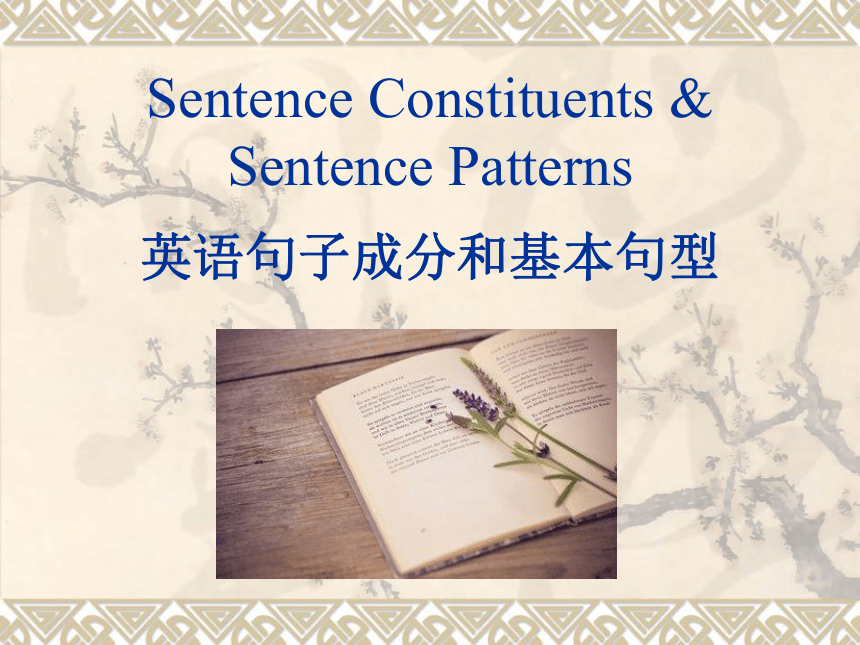
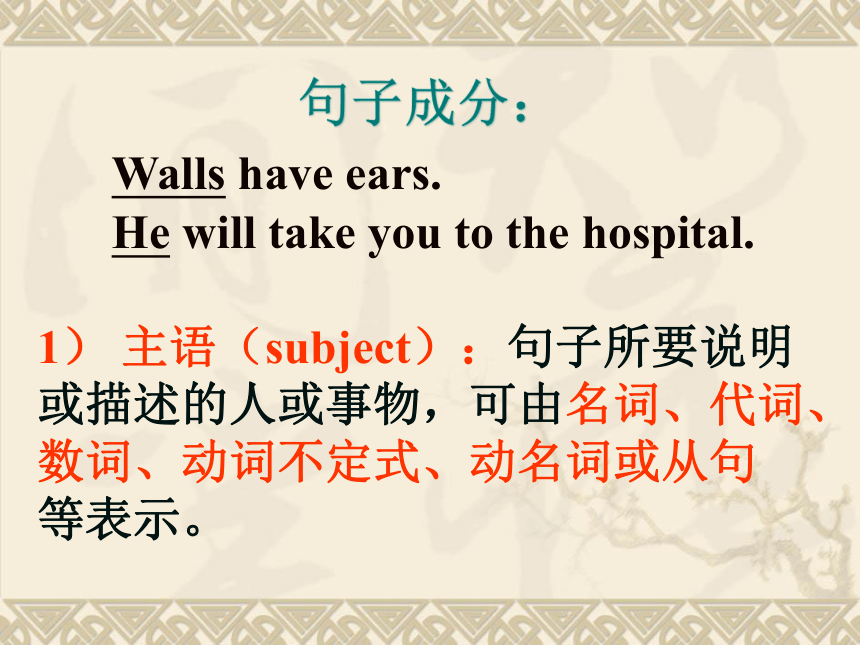
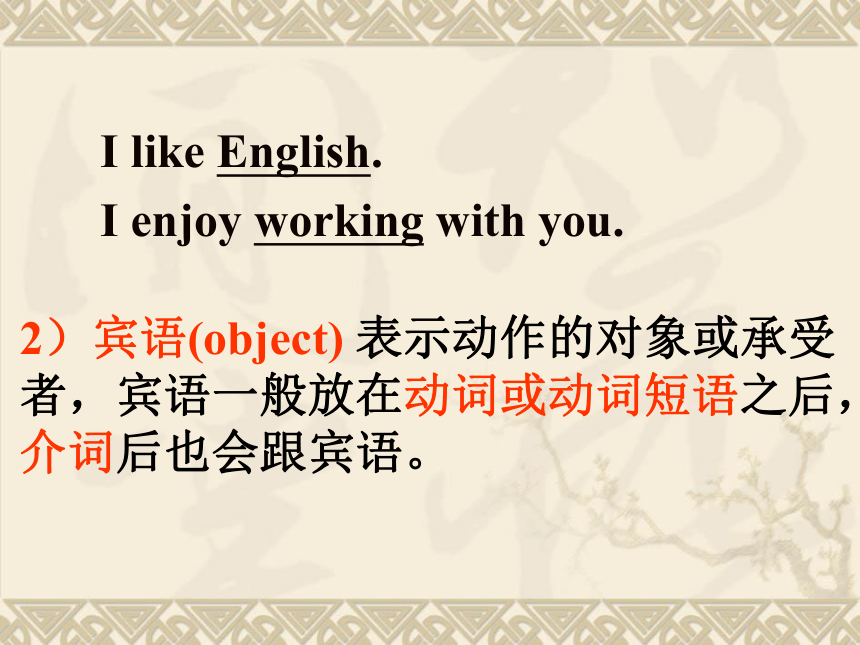
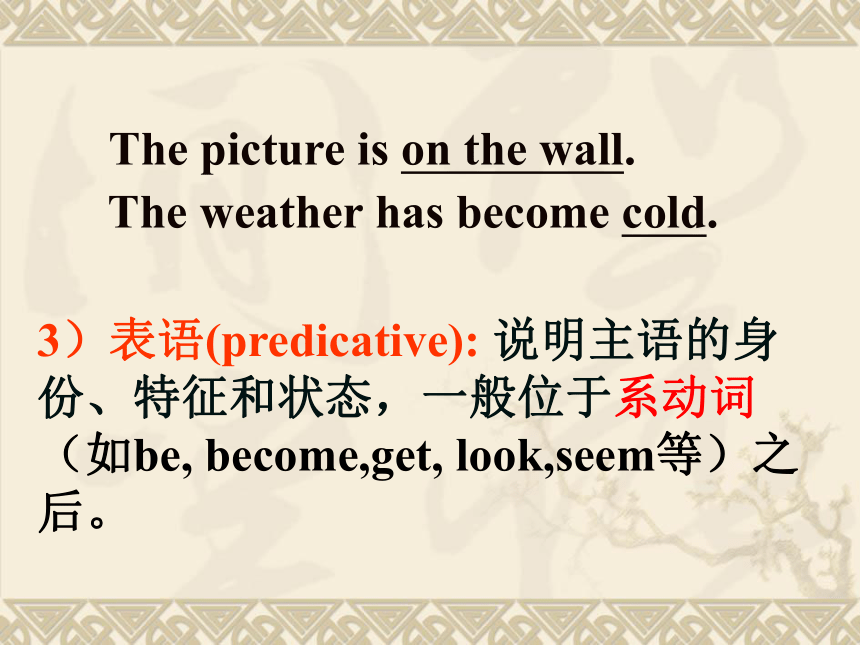
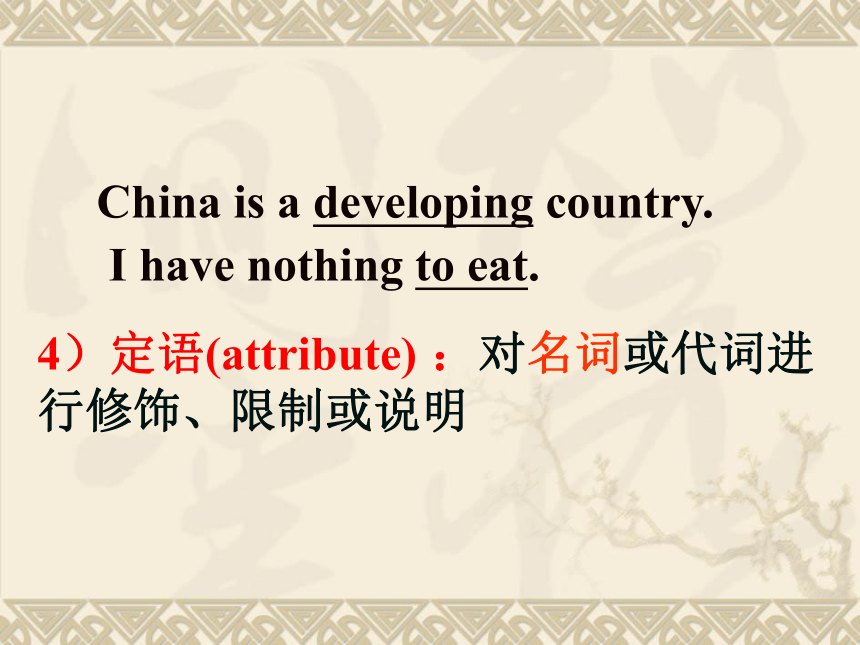
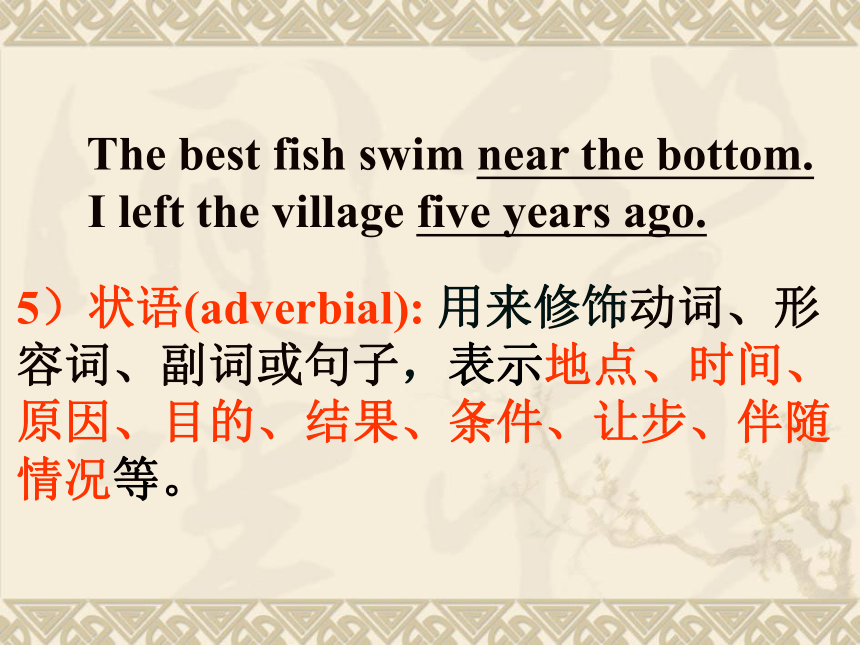
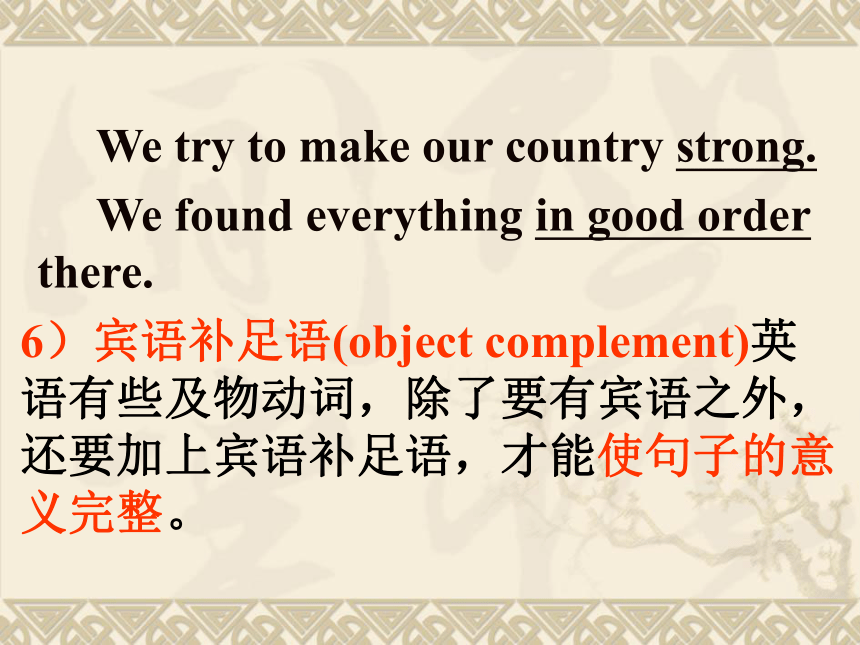
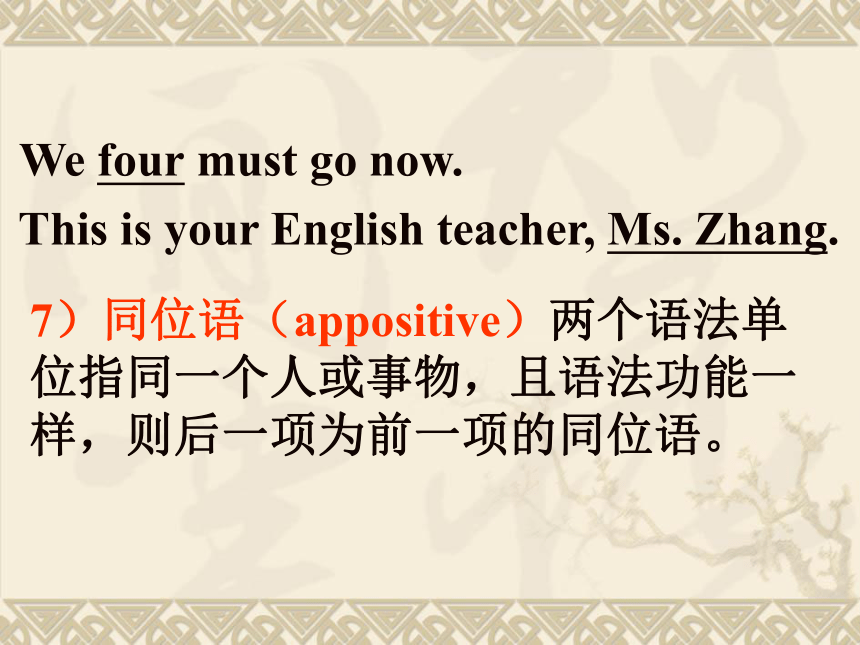

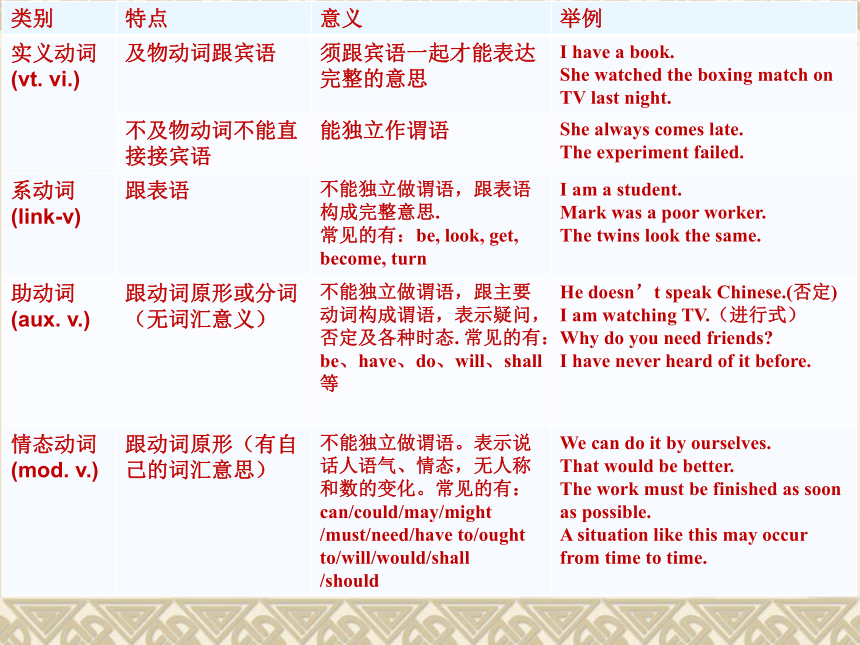
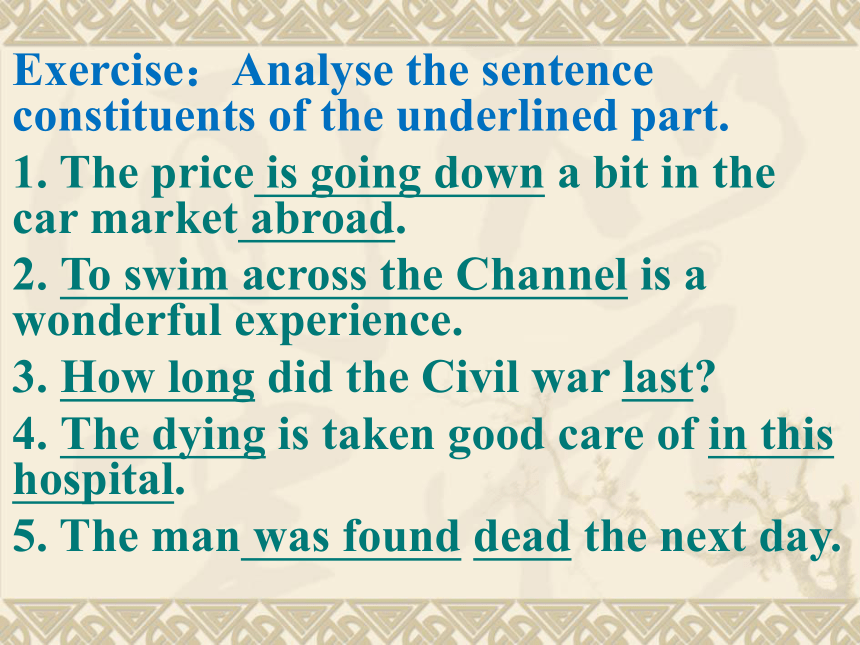
文档简介
课件36张PPT。
''That's the opportunity an education can provide.''
''What you are learning in school today will determine whether we, as a nation, can meet our greatest challenges in the future.''What's your feelings about his speech?Sentence Constituents & Sentence Patterns英语句子成分和基本句型句子成分: Walls have ears.
He will take you to the hospital.1) 主语(subject):句子所要说明
或描述的人或事物,可由名词、代词、
数词、动词不定式、动名词或从句
等表示。2)宾语(object) 表示动作的对象或承受者,宾语一般放在动词或动词短语之后,介词后也会跟宾语。 I like English.
I enjoy working with you.
The picture is on the wall.
The weather has become cold.3)表语(predicative): 说明主语的身份、特征和状态,一般位于系动词(如be, become,get, look,seem等)之后。4)定语(attribute) :对名词或代词进行修饰、限制或说明 China is a developing country.
I have nothing to eat.
5)状语(adverbial): 用来修饰动词、形容词、副词或句子,表示地点、时间、原因、目的、结果、条件、让步、伴随情况等。 The best fish swim near the bottom.
I left the village five years ago.
6)宾语补足语(object complement)英语有些及物动词,除了要有宾语之外,还要加上宾语补足语,才能使句子的意义完整。 We try to make our country strong.
We found everything in good order there.
7)同位语(appositive)两个语法单位指同一个人或事物,且语法功能一样,则后一项为前一项的同位语。 We four must go now.
This is your English teacher, Ms. Zhang.8)谓语(predicate):表示主语的身份、性质、状态和特征,一般由动词或动词短语担任,助动词或情态动词加其他动词的适当形式也构成谓语动词。 Action speaks louder than words.
Mary has been working at the dress shop since 1994. Exercise:Analyse the sentence constituents of the underlined part.
1. The price is going down a bit in the car market abroad.
2. To swim across the Channel is a wonderful experience.
3. How long did the Civil war last?
4. The dying is taken good care of in this hospital.
5. The man was found dead the next day.
主语+谓语(Vi.)
主语+谓语(Vt.)+宾语
主语+系动词(LV)+ 表语
主语+谓语(Vt.)+双宾语
主语+谓语(Vt.)+宾语+宾补
简单句(simple sentence)
-----The five basic sentence patternsTip: You’d better find out the verb in a sentence first if you want to understand its pattern. 1.主语 + 谓语(S+Vi)1)Everything changes.
2)The plane has already arrived.
(S+Vi)扩展和修饰The boy spoke to his teacher.
The little boy spoke loudly to his teacher.
The little boy named Tom spoke to his math teacher in a loud voice.
1.她昨天回家很晚。
2.事故是昨天下午发生的。
2.会议将持续两个小时。
Practice:She went home very late yesterday.The accident happened yesterday afternoon.The meeting will last two hours.2.主语 + 谓语 + 宾语 (S+Vt+O) 1) My brother takes care of the garden.
2) He forgot to close the door.
(S+Vt+O)扩展和修饰I forgot to mail the letter yesterday.
Unluckily, I forgot to mail the letter yesterday.
Unluckily, I forgot to mail the letter yesterday, which disappointed my mum so much.1.昨晚我写了一封信。
2.今天下午我想同你谈谈。
3.那位先生能流利地说三种语言。
Practice:I wrote a letter last night.I want to talk with you this afternoon.That gentleman can speak three languages fluently.
1)She looks young.
2)The city will become rich.
3.主语 + 系动词 + 表语
(S+LV+P)
在这类结构中最常用的系动词是:
“状态”类:____
“变化”类:____________________________
“感官”类:____________________________
“持续”类:____________________________
其他:(似乎)___________beget/ become/ turn/grow/gotaste/ smell/ feel/look/soundstay/ keep/remain/continueseem/appear1. 他似乎很开心。
1. 孩子们很少保持安静。
2. 这个报告听起来很有意思。
Practice:He seems very happy.The children seldom keep quiet.The report sounds interesting.4.主语 + 谓语 + 间接宾语 + 直接宾语 (S+Vt+IO+DO) 1) The man told the girl that he wants to go now.
2) The boy asked me if I could speak Chinese.Can you list some other verbs that can be followed by a double object? 1.奶奶昨晚给我们讲了一个有趣的故事。
2.请把那本字典递给我好吗?
3.他把车票给列车员看。 Practice:Grandma told me an interesting story last night.Would you please pass me the dictionary.He showed the conductor the ticket.5.主语 + 谓语 + 宾语 + 宾语补足语 (S+Vt+O+OC)
1)We found him a very good student.
2)She let me stay in the company.
若直接宾语是不定式、动名词或从句时,常用 it 做形式宾语,而将真正的宾语放到宾语补足语的后面,以使句子结构平衡。即:主语+谓语+it+宾补+真正宾语。如:
I found it very pleasant to be with your family.Tip 2) We think having a dream important. 1) My deskmate handed me a pen. 4) I sent Tom a ticket. 3) He kept me waiting for a long time. A: S+V+O+O
B: S+V+O+OC句式分析ABBAPractice:Writing persons, experiences, feelings, etc. My New School Life 其他句子类型并列句(compound sentence):
eg. He worked hard, so he got scholarship at last.
复合句(complex sentence):
eg. He asked what I wanted.
He lived in a village which is far form the city.Analyse the structure of the following sentences:
1. This means I could get up an hour later than usual, as schools in china begin before 8 a.m.(M1U1 Reading)
2. We also had different students in some classes, so it was a struggle for me to remember all the faces and names.(M1U1 Reading)
3. The experts are now fully convinced that the animal was a puma, but where had it come from?(L1, New Concept English)Analyse the structure of the following sentences:
4. The big clock which used to strike the hours day and night was damaged may years ago and has been silent ever since.(L2, New Concept English)
5. When the archaeologist reconstructed the fragments, they were amazed to find that the goddess turned out to be a very modern-looking woman.(L3, New Concept English)
Improve the following sentences:
1. The air keeps the ballon up was escaping quickly and the ballon was coming up (down).(2006全国卷Ⅲ)
2. That won't easy, I know, but we have to start anywhere (somewhere).(2012全国卷Ⅰ)
3. Have tea in the late afternoon provides a bridge between lunch and dinner.(2013新课标Ⅱ)
4.?A?woman?saw?him?drying?and?telling?him?to?wait?outside?a?shop.(2015全国卷Ⅱ)
5. When summer came (comes), they will invite their students pick the vegetables.(2017新课标Ⅱ)
telling→toldkeep→keepingeasy→be easyHave→Havingpick→to pickSummary Five basic sentence patterns?Sentence constituents? 主语、谓语、宾语、表语、定语、
状语、宾语补足语、同位语1)主语 + 谓语
2)主语 + 谓语 + 宾语
3)主语 + 系动词 + 表语
4)主语 + 谓语 + 间接宾语 + 直接宾语
5)主语 + 谓语 + 宾语 + 宾语补足语Thinking:
What’s the differences between English sentences and Chinese sentences?Homework 1. Review what you have learnt in this class.
2. Polish up your short passage.
''That's the opportunity an education can provide.''
''What you are learning in school today will determine whether we, as a nation, can meet our greatest challenges in the future.''What's your feelings about his speech?Sentence Constituents & Sentence Patterns英语句子成分和基本句型句子成分: Walls have ears.
He will take you to the hospital.1) 主语(subject):句子所要说明
或描述的人或事物,可由名词、代词、
数词、动词不定式、动名词或从句
等表示。2)宾语(object) 表示动作的对象或承受者,宾语一般放在动词或动词短语之后,介词后也会跟宾语。 I like English.
I enjoy working with you.
The picture is on the wall.
The weather has become cold.3)表语(predicative): 说明主语的身份、特征和状态,一般位于系动词(如be, become,get, look,seem等)之后。4)定语(attribute) :对名词或代词进行修饰、限制或说明 China is a developing country.
I have nothing to eat.
5)状语(adverbial): 用来修饰动词、形容词、副词或句子,表示地点、时间、原因、目的、结果、条件、让步、伴随情况等。 The best fish swim near the bottom.
I left the village five years ago.
6)宾语补足语(object complement)英语有些及物动词,除了要有宾语之外,还要加上宾语补足语,才能使句子的意义完整。 We try to make our country strong.
We found everything in good order there.
7)同位语(appositive)两个语法单位指同一个人或事物,且语法功能一样,则后一项为前一项的同位语。 We four must go now.
This is your English teacher, Ms. Zhang.8)谓语(predicate):表示主语的身份、性质、状态和特征,一般由动词或动词短语担任,助动词或情态动词加其他动词的适当形式也构成谓语动词。 Action speaks louder than words.
Mary has been working at the dress shop since 1994. Exercise:Analyse the sentence constituents of the underlined part.
1. The price is going down a bit in the car market abroad.
2. To swim across the Channel is a wonderful experience.
3. How long did the Civil war last?
4. The dying is taken good care of in this hospital.
5. The man was found dead the next day.
主语+谓语(Vi.)
主语+谓语(Vt.)+宾语
主语+系动词(LV)+ 表语
主语+谓语(Vt.)+双宾语
主语+谓语(Vt.)+宾语+宾补
简单句(simple sentence)
-----The five basic sentence patternsTip: You’d better find out the verb in a sentence first if you want to understand its pattern. 1.主语 + 谓语(S+Vi)1)Everything changes.
2)The plane has already arrived.
(S+Vi)扩展和修饰The boy spoke to his teacher.
The little boy spoke loudly to his teacher.
The little boy named Tom spoke to his math teacher in a loud voice.
1.她昨天回家很晚。
2.事故是昨天下午发生的。
2.会议将持续两个小时。
Practice:She went home very late yesterday.The accident happened yesterday afternoon.The meeting will last two hours.2.主语 + 谓语 + 宾语 (S+Vt+O) 1) My brother takes care of the garden.
2) He forgot to close the door.
(S+Vt+O)扩展和修饰I forgot to mail the letter yesterday.
Unluckily, I forgot to mail the letter yesterday.
Unluckily, I forgot to mail the letter yesterday, which disappointed my mum so much.1.昨晚我写了一封信。
2.今天下午我想同你谈谈。
3.那位先生能流利地说三种语言。
Practice:I wrote a letter last night.I want to talk with you this afternoon.That gentleman can speak three languages fluently.
1)She looks young.
2)The city will become rich.
3.主语 + 系动词 + 表语
(S+LV+P)
在这类结构中最常用的系动词是:
“状态”类:____
“变化”类:____________________________
“感官”类:____________________________
“持续”类:____________________________
其他:(似乎)___________beget/ become/ turn/grow/gotaste/ smell/ feel/look/soundstay/ keep/remain/continueseem/appear1. 他似乎很开心。
1. 孩子们很少保持安静。
2. 这个报告听起来很有意思。
Practice:He seems very happy.The children seldom keep quiet.The report sounds interesting.4.主语 + 谓语 + 间接宾语 + 直接宾语 (S+Vt+IO+DO) 1) The man told the girl that he wants to go now.
2) The boy asked me if I could speak Chinese.Can you list some other verbs that can be followed by a double object? 1.奶奶昨晚给我们讲了一个有趣的故事。
2.请把那本字典递给我好吗?
3.他把车票给列车员看。 Practice:Grandma told me an interesting story last night.Would you please pass me the dictionary.He showed the conductor the ticket.5.主语 + 谓语 + 宾语 + 宾语补足语 (S+Vt+O+OC)
1)We found him a very good student.
2)She let me stay in the company.
若直接宾语是不定式、动名词或从句时,常用 it 做形式宾语,而将真正的宾语放到宾语补足语的后面,以使句子结构平衡。即:主语+谓语+it+宾补+真正宾语。如:
I found it very pleasant to be with your family.Tip 2) We think having a dream important. 1) My deskmate handed me a pen. 4) I sent Tom a ticket. 3) He kept me waiting for a long time. A: S+V+O+O
B: S+V+O+OC句式分析ABBAPractice:Writing persons, experiences, feelings, etc. My New School Life 其他句子类型并列句(compound sentence):
eg. He worked hard, so he got scholarship at last.
复合句(complex sentence):
eg. He asked what I wanted.
He lived in a village which is far form the city.Analyse the structure of the following sentences:
1. This means I could get up an hour later than usual, as schools in china begin before 8 a.m.(M1U1 Reading)
2. We also had different students in some classes, so it was a struggle for me to remember all the faces and names.(M1U1 Reading)
3. The experts are now fully convinced that the animal was a puma, but where had it come from?(L1, New Concept English)Analyse the structure of the following sentences:
4. The big clock which used to strike the hours day and night was damaged may years ago and has been silent ever since.(L2, New Concept English)
5. When the archaeologist reconstructed the fragments, they were amazed to find that the goddess turned out to be a very modern-looking woman.(L3, New Concept English)
Improve the following sentences:
1. The air keeps the ballon up was escaping quickly and the ballon was coming up (down).(2006全国卷Ⅲ)
2. That won't easy, I know, but we have to start anywhere (somewhere).(2012全国卷Ⅰ)
3. Have tea in the late afternoon provides a bridge between lunch and dinner.(2013新课标Ⅱ)
4.?A?woman?saw?him?drying?and?telling?him?to?wait?outside?a?shop.(2015全国卷Ⅱ)
5. When summer came (comes), they will invite their students pick the vegetables.(2017新课标Ⅱ)
telling→toldkeep→keepingeasy→be easyHave→Havingpick→to pickSummary Five basic sentence patterns?Sentence constituents? 主语、谓语、宾语、表语、定语、
状语、宾语补足语、同位语1)主语 + 谓语
2)主语 + 谓语 + 宾语
3)主语 + 系动词 + 表语
4)主语 + 谓语 + 间接宾语 + 直接宾语
5)主语 + 谓语 + 宾语 + 宾语补足语Thinking:
What’s the differences between English sentences and Chinese sentences?Homework 1. Review what you have learnt in this class.
2. Polish up your short passage.
